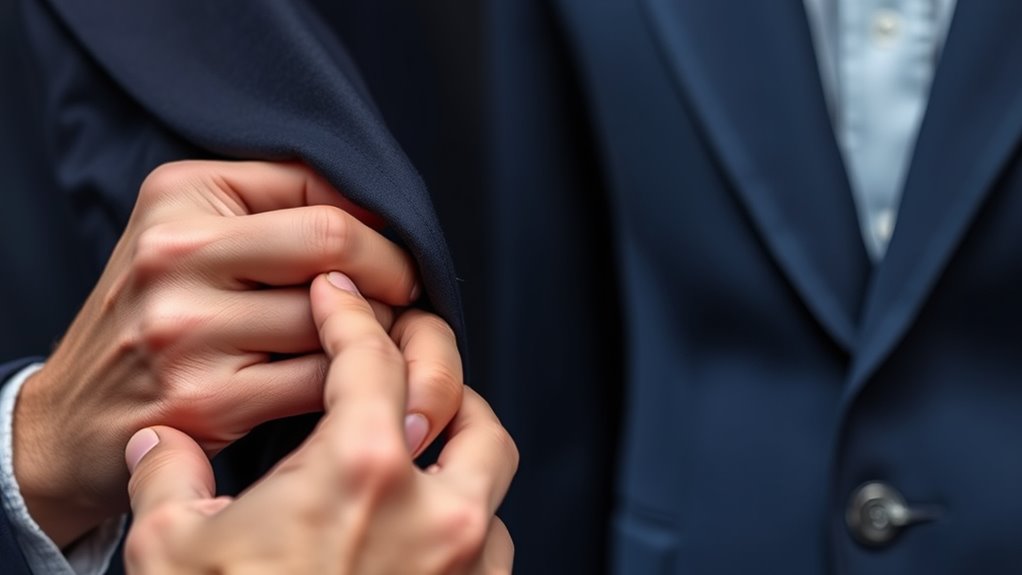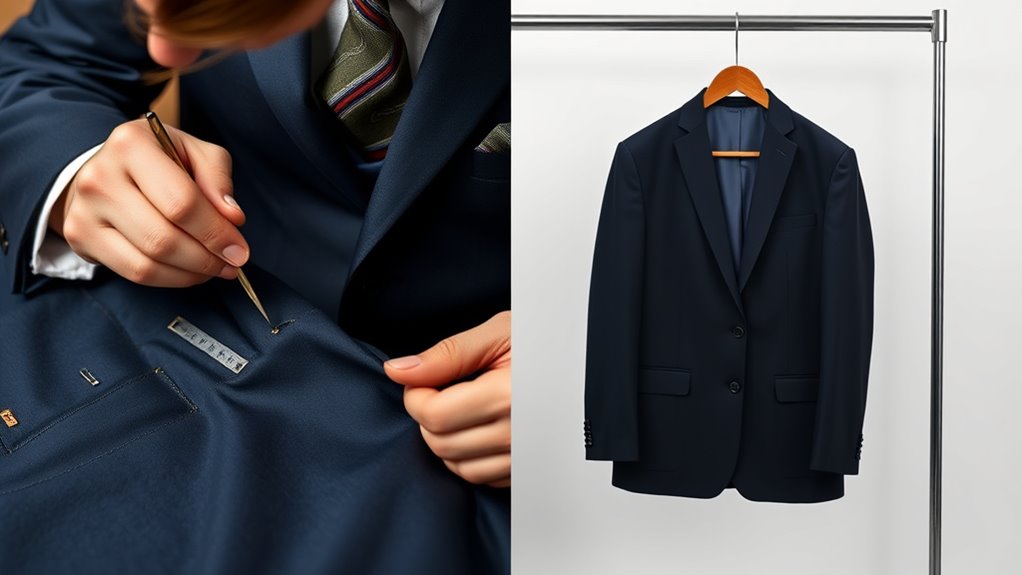Custom suits cost more because they’re crafted with expert handwork, premium fabrics, and personalized fittings, all adding up in time and skill. Unlike off-the-rack options, a bespoke suit is tailored specifically to your body, style, and preferences, ensuring a perfect fit and unique details. The process involves extensive craftsmanship and high-quality materials that last longer. Keep exploring to discover how these factors create unparalleled value and quality.
Key Takeaways
- Custom suits involve skilled craftsmanship, extensive handwork, and multiple fittings, increasing production time and labor costs.
- Premium fabrics and exclusive sourcing elevate the quality, durability, and personalized feel of bespoke suits.
- The meticulous tailoring process ensures a perfect fit, requiring more time and precise adjustments than mass-produced options.
- Bespoke suits are handcrafted with attention to detail, such as hand-sewn elements, which are absent in off-the-rack garments.
- Longer manufacturing duration and higher-quality materials contribute to the higher price point of custom tailoring.
The Craftsmanship Behind Custom Suits

Custom suits are a true demonstration of expert craftsmanship, where every detail is meticulously handcrafted to fit your unique measurements. Advanced fabric innovation plays a key role, as tailors select and work with the finest textiles designed for durability, comfort, and style. Manufacturing automation streamlines parts of the process, ensuring precision in cutting and patterning, but the true artistry lies in the tailoring. Skilled artisans spend hours hand-sewing and fitting each suit, paying close attention to subtle details like stitch quality and lapel shaping. This blend of cutting-edge technology and traditional craftsmanship guarantees a perfect fit and superior finish. Unlike mass-produced options, custom suits are a testament to human skill and innovation, resulting in a garment tailored precisely to your body and style preferences. Effective track development is essential for creating suits that blend functionality and aesthetic appeal, ensuring each piece meets high standards of design and craftsmanship. Incorporating traditional tailoring techniques ensures that each suit maintains a high level of quality and attention to detail, setting it apart from off-the-rack options. Additionally, the emphasis on artisanal skills highlights the importance of human expertise in producing a truly bespoke garment. Moreover, color accuracy in fabric selection can enhance the visual appeal and ensure the suit complements your personal style. Incorporating quality control measures throughout the process further guarantees the durability and excellence of each finished piece.
Material Quality and Selection

When choosing a suit, material quality and selection make all the difference. You’ll find that bespoke tailors offer premium fabric choices and custom sourcing to meet your exact preferences. This focus on higher quality standards guarantees your suit looks better and lasts longer. Additionally, the ability to select from various fabric options ensures your suit can be tailored to both your style and comfort preferences. High-quality materials, such as performance fabrics, can also provide added durability and resistance to wear over time. Furthermore, material selection plays a crucial role in achieving the desired fit and feel, allowing for a truly personalized suit experience.
Premium Fabric Choices
Choosing the right fabric is essential to achieving a high-quality suit, whether you opt for bespoke tailoring or off-the-rack. Premium fabrics offer superior fabric durability, ensuring your suit withstands regular wear without losing shape or quality. When selecting materials, you’ll find a wide array of color options, allowing you to customize your look to match your style and occasions. High-end fabrics tend to be softer, more breathable, and better at maintaining their appearance over time, which justifies the higher cost of bespoke suits. While off-the-rack options may have limited fabric choices, bespoke tailors often source exclusive textiles to meet your preferences. Investing in premium fabric choices guarantees a suit that not only looks sharp but also lasts longer, providing better value in the long run. Fabric selection plays a crucial role in determining the overall quality and longevity of your suit.
Custom Material Sourcing
Opting for bespoke tailoring gives you the advantage of sourcing materials directly from select suppliers, guaranteeing only the highest quality fabrics make it into your suit. Your fabric sourcing process is personalized, allowing you to choose from a curated selection that meets your specific preferences for texture, weight, and appearance. Strong supplier relationships play a key role, giving you access to premium textiles not available in mass-market options. These relationships also enable you to request custom blends or exclusive weaves, elevating the uniqueness of your suit. By overseeing the fabric sourcing process, you ensure each material aligns with your standards, resulting in a garment that’s tailored precisely to your expectations. This meticulous selection process justifies the higher cost of custom suits compared to off-the-rack options. Additionally, understanding premium materials helps you appreciate the craftsmanship behind your bespoke garment. Recognizing the importance of creative practice in selecting fabrics can also inspire more personalized choices. Being aware of fabric sourcing strategies can further enhance your ability to select truly exceptional materials for your suit, especially when considering the impact of fuel injection cleaning on vehicle performance, which highlights the importance of quality and precision in all aspects of craftsmanship.
Higher Quality Standards
By personally selecting your fabric, you set a higher standard for quality that off-the-rack options often can’t match. This choice directly influences fabric durability, ensuring your suit withstands daily wear and maintains its appearance over time. When you choose bespoke, you benefit from a broader design variety, allowing you to select unique patterns, textures, and weights suited to your preferences. Custom tailors source only premium materials, emphasizing superior craftsmanship and long-lasting quality. Off-the-rack suits typically use standardized fabrics that may sacrifice durability and design options for mass production. By opting for bespoke, you’re investing in a fabric that aligns with your standards, resulting in a suit that not only looks exceptional but also endures through years of use. Additionally, fabric quality directly impacts allergen resistance and breathability, contributing to your overall comfort and health. Material selection allows for careful consideration of fabric properties that enhance your suit’s longevity and suitability for different climates.
The Fitting Process and Personalization

The fitting process is where bespoke tailoring truly shines, allowing for a level of personalization that off-the-rack options can’t match. During your fitting, your tailor assesses fabric durability, ensuring the material will withstand daily wear. This step also emphasizes alteration flexibility, so your suit can be refined for perfect comfort and fit. Additionally, attention to details like Rhythm Failure can influence the overall aesthetic and style choices, ensuring your suit reflects your unique personality. Here’s what you can expect: 1. Precise measurements tailored to your body shape, minimizing the need for future adjustments. 2. Customization options, such as lapel style, pocket design, and lining choices, reflecting your personal style. 3. Feedback-driven adjustments that enhance comfort and appearance, making your suit uniquely yours. 4. The tailor may also evaluate climate considerations to select appropriate fabrics that maintain comfort across seasons, enhancing the suit’s overall functionality. Moreover, selecting fabrics with specific durability features ensures your bespoke suit remains in excellent condition over time. Understanding fabric quality is essential, as it directly impacts the suit’s longevity and appearance, making the selection process even more personalized. In addition, discussing manufacturing techniques can provide insight into the craftsmanship involved, further elevating the quality of your tailored suit. This personalized process guarantees a suit that fits flawlessly and aligns with your preferences.
Time Investment and Crafting Duration

A bespoke suit takes more time to craft than an off-the-rack option, requiring weeks instead of days. You’ll spend additional hours during personalized fittings to guarantee the perfect fit. This longer process ensures your suit is tailored precisely to your measurements and style preferences. Incorporating automation in business intelligence can also streamline parts of the tailoring process, but the handcrafted quality and attention to detail in bespoke suits remain unmatched. Additionally, the time investment involved in bespoke tailoring allows for meticulous craftsmanship that cannot be replicated by machines. Recognizing the importance of customization options further emphasizes the bespoke process’s detailed nature, which aligns with the comprehensive planning and execution described in effective leadership practices.
Longer Crafting Process
Because bespoke tailoring involves meticulous handcrafting and multiple fittings, it naturally takes more time than off-the-rack options. This longer process reflects your commitment to quality and detail. First, the tailor carefully applies various tailoring techniques, ensuring every stitch enhances the suit’s fit and durability. Second, fabric sourcing demands time; selecting premium materials and sourcing them from specific suppliers adds to the overall duration. Finally, each step—from pattern creation to hand-sewing—requires precision and patience. These elements combined mean your suit isn’t just assembled quickly; it’s crafted thoughtfully with attention to every detail. The extended crafting process guarantees a suit tailored perfectly to your measurements and style, which explains why bespoke suits cost more. Additionally, vibrational alignment during the process ensures that the energy and intention behind your custom suit resonate with your personal style and confidence.
Personalized Fitting Time
Personalized fitting time is a crucial aspect of bespoke tailoring, as it directly reflects the time you invest in achieving a perfect fit. During this phase, skilled tailors utilize precise tailoring techniques to adjust every detail to your body’s unique shape. This process often involves multiple fittings, allowing for fine-tuning and ensuring the suit conforms flawlessly. The time spent also depends on fabric sourcing, as selecting high-quality, custom fabrics can extend the fitting schedule but enhances the overall quality. Unlike off-the-rack options, where alterations are limited, bespoke tailoring dedicates hours to personalized adjustments. This meticulous process guarantees a suit that not only fits perfectly but also aligns with your style preferences, making the extra time investment well worth the superior craftsmanship and individual attention.
The Role of Handwork and Detailing

Handwork and intricate detailing are what elevate bespoke tailoring from standard off-the-rack options. These details showcase craftsmanship and allow you to customize your suit’s look and feel. With fabric innovation, you get the latest materials that enhance comfort and style. Hand-sewn elements like pick-stitching and buttonholes add subtle sophistication, emphasizing quality and precision. Additionally, attention to detail improves style versatility, enabling your suit to adapt to various occasions—formal or casual.
- Precise hand-stitched finishing ensures durability and a refined appearance.
- Custom detailing enhances fabric innovation, making each suit uniquely suited to your preferences.
- Fine handwork allows for tailored adjustments, increasing style versatility and overall fit.
Longevity and Overall Value

When considering the long-term value of a suit, bespoke tailoring often proves to be a smarter investment than off-the-rack options. Custom suits tend to last longer because they’re crafted with quality materials and precise craftsmanship, which enhances durability. Additionally, a suit’s overall value increases as it ages well and maintains its shape. Mass production can compromise quality, affecting longevity and brand reputation over time.
| Aspect | Bespoke Tailoring | Off-The-Rack | Impact |
|---|---|---|---|
| Material Quality | High-grade, durable fabrics | Varies, often lower quality | Longer lifespan for bespoke |
| Fit & Construction | Perfect, tailored fit | Generic fit, loose or tight | Better wearability |
| Brand Reputation | Known for craftsmanship | Mass-produced, less exclusive | Perceived value |
| Longevity | Typically exceeds 10 years | Shorter lifespan | Overall better investment |
Cost Comparison: Custom vs. Ready-Made

While bespoke suits often come with a higher upfront cost, they can be more cost-effective in the long run because of their superior quality and durability. You might pay more initially, but you gain better value through longevity and craftsmanship. When comparing costs, consider these factors:
- Brand reputation: Established tailors often justify higher prices with their reputation for quality and exclusivity, making the investment worthwhile.
- Price flexibility: Ready-made suits tend to have less room for negotiation, while bespoke options can be tailored to fit your budget, offering more price flexibility.
- Durability and fit: Custom suits last longer and fit better, reducing the need for frequent replacements or adjustments, ultimately saving you money over time.
Frequently Asked Questions
How Do Tailor-Made Suits Influence Personal Style and Wardrobe Versatility?
Tailor-made suits boost your personal expression by fitting perfectly and reflecting your unique style. They enhance wardrobe flexibility, allowing you to choose fabrics, cuts, and details that match your preferences. With a custom suit, you gain a versatile piece that works for various occasions, giving you confidence and sophistication. This personalized approach guarantees your wardrobe truly represents you, making every outfit feel intentional and refined.
Can Custom Suits Be Altered Easily if My Size Changes?
Custom suits can be altered, but alteration challenges may arise if your size changes substantially. Since they’re made to your precise measurements, small tweaks are usually straightforward, offering some size flexibility. However, major adjustments might be limited, and you could need a new suit if your body shape shifts considerably. It’s best to work with a skilled tailor to understand what alterations are possible and how they’ll affect the fit.
What Ethical Considerations Are Involved in Bespoke Tailoring?
When choosing bespoke tailoring, you should consider ethical factors like sustainable sourcing and fair labor practices. You actively support environmentally friendly materials and ensure workers are paid fairly, reducing exploitation. By opting for tailor-made suits from ethical brands, you promote responsible fashion. This approach helps minimize environmental impact and upholds social justice, aligning your style choices with your values and making a positive difference in the fashion industry.
How Do Different Countries’ Tailoring Traditions Affect Suit Prices?
Did you know that tailoring cultures in Italy and England can make suits up to 50% more expensive? Different countries’ tailoring traditions directly influence price disparities, with some regions emphasizing handcrafted details and luxurious fabrics. You’ll find that in countries with rich tailoring heritages, suits cost more because of skilled craftsmanship and premium materials, making your investment truly worth it if you value tradition and quality.
Are There Eco-Friendly Options in Custom Suit Production?
Yes, you can find eco-friendly options in custom suit production. Look for tailors that use sustainable fabrics like organic cotton, hemp, or recycled wool, which reduce environmental impact. Many now prioritize eco-conscious production methods, minimizing waste and energy use. By choosing these options, you’re supporting sustainable fashion while enjoying a high-quality, personalized suit that aligns with your values. Always ask your tailor about their eco-friendly practices and fabric choices.
Conclusion
In the end, choosing a bespoke suit is like commissioning a masterpiece from a master painter—you invest time, craftsmanship, and care that off-the-rack simply can’t match. While the price tag might seem steep, remember that you’re getting personalized quality, durability, and a fit as unique as a Renaissance portrait. So, don’t let the price be your only guide—think of it as your own modern-day armor, crafted with the skill of a bygone era.









